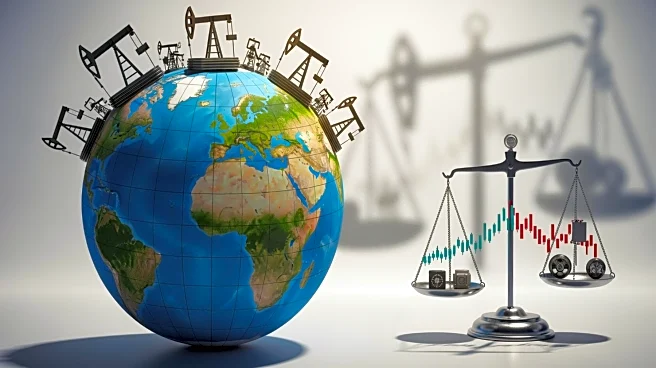What's Happening?
Russian President Vladimir Putin has addressed the recent U.S. sanctions imposed on Russia's two largest oil companies, Rosneft and Lukoil. These sanctions, described by Putin as 'serious,' were enacted by the United States as a response to ongoing geopolitical
tensions. Despite acknowledging the severity of these measures, Putin asserted that they would not significantly impact Russia's economic stability. He characterized the sanctions as an 'unfriendly act' that could hinder the recovery of Russia-U.S. relations. The Russian Foreign Ministry also expressed concerns, suggesting that the sanctions could undermine diplomatic efforts to resolve the conflict in Ukraine. However, they claimed that Russia has developed a 'strong immunity' to such economic pressures.
Why It's Important?
The imposition of sanctions on major oil producers like Rosneft and Lukoil is significant due to the central role of the energy sector in Russia's economy. These companies are pivotal to Russia's financial health, and any disruption could have broader implications for global energy markets. The sanctions reflect ongoing tensions between the U.S. and Russia, particularly concerning the conflict in Ukraine. While Russia claims resilience against these economic measures, the sanctions could strain diplomatic relations further and complicate international efforts to address the Ukraine crisis. The situation underscores the geopolitical complexities and the potential for economic policies to influence international diplomacy.
What's Next?
The future of Russia-U.S. relations remains uncertain as both nations navigate the implications of these sanctions. Potential responses from Russia could include seeking alternative markets or strengthening alliances with non-Western countries to mitigate the impact. The international community will likely monitor the situation closely, particularly regarding any shifts in energy markets or diplomatic engagements. The effectiveness of the sanctions in achieving their intended political outcomes will be a subject of analysis and debate among policymakers and analysts.
Beyond the Headlines
The designation of The Moscow Times as an 'undesirable' organization highlights the broader issue of press freedom in Russia. This move is part of a pattern of actions against independent journalism, raising concerns about the state of media freedom and the ability of journalists to operate without fear of prosecution. The international community may view these developments as indicative of broader human rights and governance issues within Russia, potentially influencing future diplomatic and economic interactions.
















